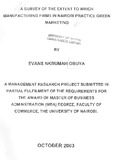| dc.description.abstract | Environmental marketing has gained momentum over the years to levels beyond.
Customer awareness, competition and government legislation have been key drivers of
going green the world over. The main objectives of this study were two. One, to establish
the extent to which manufacturing firms in Nairobi practice green marketing and two, the
factors that influence the practice of green marketing.
To aid in this study, a survey of firms in Nairobi was undertaken using a questionnaire.
The questionnaire was administered by a 'drop and pick later' method. The
questionnaire was selected because of the low cost associated with its use compared to
other methods and the high degree of anonymity it gives to respondents who consider
certain responses as sensitive. The population of the study was all manufacturing firms
in Nairobi, the sampling frame being provided by two directories, The Kenya Association
of Manufacturers directory and Kenya Directory of Manufacturing Industries. Forty (40)
firms were selected for the study. The respondents were middle level managers with
responsibility in the production functions. The data collected was analyzed using
descriptive statistics to make the information more understandable. The respondents
were from firms that were either wholly foreign owned or largely foreign owned.
The study findings showed that the extent to which manufacturing firms practice green
marketing in Nairobi is appreciable and that this concept plays a key role in driving the
manufacturing processes, pricing, positioning and promotion of products. The results
also revealed that customer awareness, competitive activity, government legislation,
growth opportunities and the need to prepare themselves for future markets drive the
greening initiatives. Management commitment is crucial in any greening activities as it is
at this level that strategic decisions are made.
However, certain limitations are evident. The fact that the study was restricted to Nairobi
does not provide good measure of the practice in Kenya as whole. Incidences of
reluctance by prospective respondents due to certain fears also jeopardize the study.
This notwithstanding there are suggestions for further research. The research focussed
on manufacturers, but it would be of interest to find out what the customers themselves
feel. Another area of study would be to look at locally owned firms, to find out their
approach to this issue. | en |

